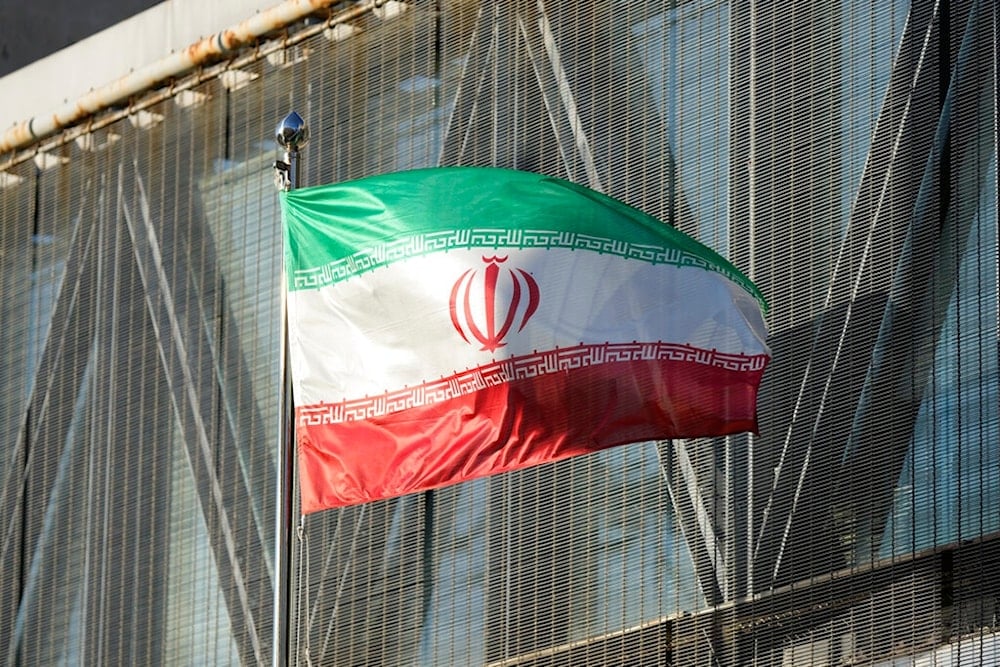Iran confirms indirect contact with Syria
Speaking at the World Government Summit on Wednesday, Syria's Foreign Minister Asaad al-Shibani suggested that Damascus expects more than verbal assurances from Russia and Iran.
-

Iran's national flag flutters at the Iran embassy in Seoul, South Korea, Tuesday, Oct. 18, 2022 (AP)
Iran has acknowledged receiving messages from Syria and maintaining indirect communication with Damascus, according to Mohammad Reza Raouf Sheibani, the Iranian foreign minister's special envoy for Syrian affairs.
"The Islamic Republic of Iran is indirectly in contact with Damascus, and we have also received messages," Sheibani confirmed, reflecting Tehran's continued engagement in Syrian affairs.
Iran Closely Observing Syrian Developments
Sheibani stressed that Iran is monitoring events in Syria and will determine its course of action at the appropriate time. "We are carefully monitoring the developments in Syria and will make our own decision at the appropriate time," he stated.
Tehran maintains that Syria's sovereignty and future should be shaped by its own people, advocating for the participation of all political groups in determining the country's path. "Certainly, the stability and peace of Syria is of special importance to us, and we are against any foreign interference in the affairs of this country," Sheibani emphasized.
Syria Demands More Than Diplomatic Reassurances
In spite of Iran's reassurances, Syria is seeking more than diplomatic statements and pressing for a clearer policy from its allies.
Syria's Foreign Minister Asaad al-Shibani, speaking at the World Government Summit on Wednesday, suggested that Damascus expects more than verbal assurances from Russia and Iran. "There are positive messages, but we want these positive messages to turn into a clear policy that makes the Syrian people feel reassured," he stated.
Shibani's remarks indicate that while Iran and Russia remain key partners, Syria's leadership expects concrete commitments rather than broad diplomatic affirmations.
Read more: Syria seeking 'clear policy' from Russia, Iran: FM
Iran-Russia Talks Center on Syria
On Friday, Sheibani traveled to Moscow for discussions with Russian officials, including Alexander Lavrentiev, Russian President Vladimir Putin's special envoy for Syria, and Deputy Foreign Minister Mikhail Bogdanov.
During the bilateral meeting, both sides exchanged views on the current regional landscape, focusing on the Syrian crisis. Tehran and Moscow reaffirmed their commitment to Syria's unity, sovereignty, and territorial integrity, underlining the importance of stability through international efforts in line with these principles.
Both nations also stressed that Syria's internal matters should be resolved domestically, through a process that includes all political, ethnic, and religious factions.
Strategic Coordination in Syria Amid Financial Ties
These developments highlight Iran's ongoing role in Syria and its continued coordination with Russia. As both countries push for political solutions free from foreign interference, their diplomatic moves signal a sustained effort to shape Syria's future amid broader regional complexities.
Beyond political coordination, Russia's financial support has become increasingly critical for Syria's new government. Western sanctions prevent Damascus from acquiring banknotes from European suppliers, forcing it to rely on Russia for newly printed currency. A recent shipment of Syrian banknotes from Moscow, confirmed by Syria's central bank, underscores Damascus' continued financial dependency on its key ally.
Read more: Syria receives Russian banknotes to ease cash shortage: FT
Syria Reassessing Regional, Global Alliances
Amid these shifts, Syria is recalibrating its regional and global alliances, weighing its reliance on Iran and Russia while exploring new diplomatic avenues. Al-Shibani has been invited for an official visit to Iraq, while Syria's new Defense Minister, Murhaf Abu Qasra, has signaled that Damascus is open to discussions with Russia, Türkiye, and even the United States regarding military bases in Syria.

 4 Min Read
4 Min Read









